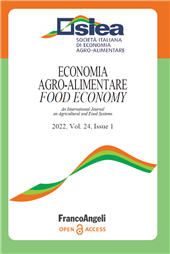Asymmetric Price Transmission in the Cocoa Supply Chain in Indonesia
1-21 p.
This study investigates the asymmetric price transmission (APT) of global cocoa beans and cocoa pasta prices to farm prices. The cocoa pasta variable is a proxy for Indonesian processed cocoa industry products. We use monthly time series data from January 2007 to December 2020. The NARDL model was used to estimate the APT response behavior. The dummy variable (export cocoa bean tax) explains fluctuations in farm prices before and after the policy implementation. The results showed asymmetric cointegration between the global cocoa market and cocoa pasta prices moving towards farm cocoa prices in Indonesia. APT occurs in the short and long term with different significant levels for each variable. The increase (decrease) in the global market and cocoa pasta prices were transmitted asymmetrically in the short and long terms, except for the variable (PApos), which is not significant in the long term. We observe strong evidence of negative asymmetric price transmission.
Negative price shocks (decreases) in global markets and cocoa pasta are more rapidly transmitted to farmer prices than positive price shocks. Adjustment prices occur in magnitude, speed, and sign. The high coefficient of negative asymmetric price transmission indicates the uncompetitive of Indonesia's supplydemand cocoa chain. At the same time, the cocoa bean export tax harms farm prices. The export tax policy has reduced farm prices by approximately 2.3%. [Publisher's text].
Is part of
Economia agro-alimentare : XXIV, 1, 2022-
Articles from the same issue (available individually)
-
Information
ISSN: 1972-4802
KEYWORDS
- market integration, international trade, producer price, NARDL


